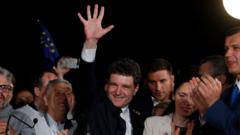In a continued effort to pressure Russia, the E.U. has unveiled a new sanctions package targeting covert oil exports, with hopes of prompting negotiations to end the Ukraine conflict.
E.U. Intensifies Pressure on Russia with New Sanctions

E.U. Intensifies Pressure on Russia with New Sanctions
European Union Takes Aim at Covert Oil Exports in Bid to Encourage Peace Talks
The European Union's defense and foreign ministers have approved a fresh round of sanctions against Russia, focusing specifically on its clandestine oil shipping operations. This move follows recent comments from the European Commission that indicate an intent to impose even stricter measures in the near future. The aim of these sanctions is to inflict greater economic hardship on Russia, potentially nudging President Vladimir V. Putin towards meaningful peace negotiations over the ongoing war in Ukraine.
These developments arise amidst evolving sentiments in the U.S. concerning its approach to sanctions following a critical discussion between President Trump and Mr. Putin. Previously, the U.S., alongside the E.U., had consistently pressed for an immediate cease-fire from Russia, but the latest communication appears to have tempered that stance.
Since the outset of the full-scale invasion in 2022, E.U. nations have instituted significant restrictions against Russia, leading to this latest batch, which is now regarded as the 17th set. Notably, this new batch targets Russia’s “shadow fleet”—an array of older tanker vessels that the country utilizes to secretly carry and sell oil internationally.
Officials in the European Union are already in discussions regarding an 18th sanctions package. Ursula von der Leyen, the Commission's president, has indicated that future measures might include targeting gas pipelines, financial institutions, and further constraining the Russian energy market.
Highlighting the urgency of the situation, Kaja Kallas, the top diplomat for the European Union, stressed the need for sustained pressure on Russia, asserting, “It takes two to want peace, and it takes only one to want war. In order to make Russia want peace, also, we need to put more pressure on Russia.”
These developments arise amidst evolving sentiments in the U.S. concerning its approach to sanctions following a critical discussion between President Trump and Mr. Putin. Previously, the U.S., alongside the E.U., had consistently pressed for an immediate cease-fire from Russia, but the latest communication appears to have tempered that stance.
Since the outset of the full-scale invasion in 2022, E.U. nations have instituted significant restrictions against Russia, leading to this latest batch, which is now regarded as the 17th set. Notably, this new batch targets Russia’s “shadow fleet”—an array of older tanker vessels that the country utilizes to secretly carry and sell oil internationally.
Officials in the European Union are already in discussions regarding an 18th sanctions package. Ursula von der Leyen, the Commission's president, has indicated that future measures might include targeting gas pipelines, financial institutions, and further constraining the Russian energy market.
Highlighting the urgency of the situation, Kaja Kallas, the top diplomat for the European Union, stressed the need for sustained pressure on Russia, asserting, “It takes two to want peace, and it takes only one to want war. In order to make Russia want peace, also, we need to put more pressure on Russia.”





















